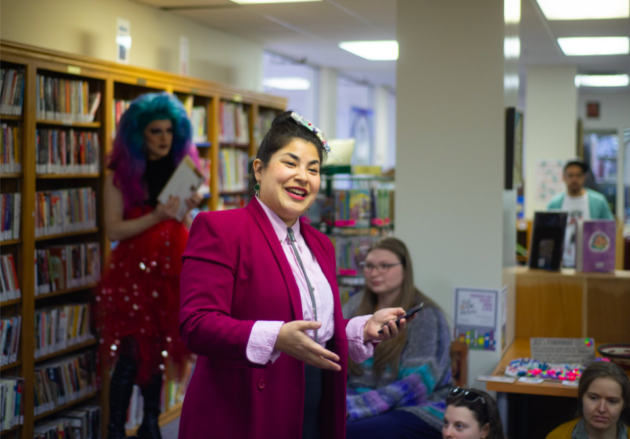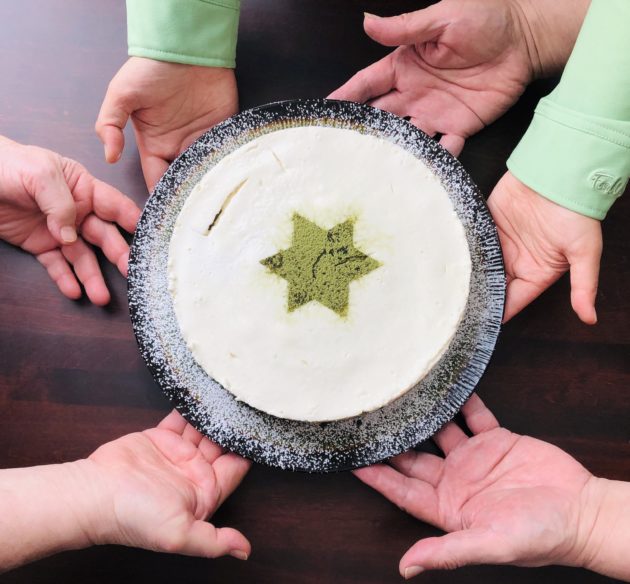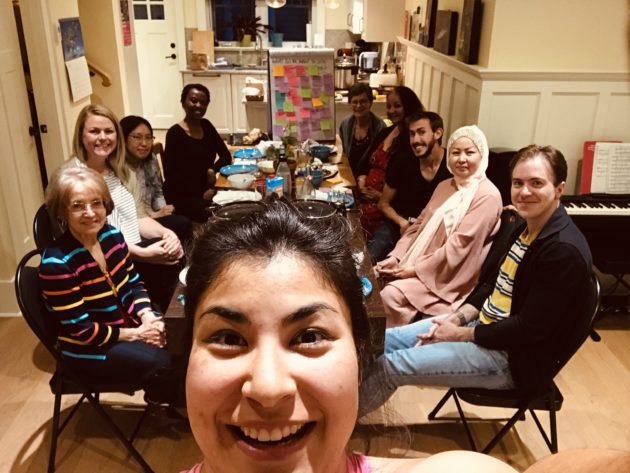
Community Engagement as Art
Inspired in large part by a call put out by No Silence on Race last summer to build a more inclusive anti-racist Jewish community in Canada, a Toronto gallery focused on programming work by Black and Jewish artists. FENTSTER (Yiddish for ‘window’) exhibited in their streetfront window gallery in downtown Toronto new work by photo-video artist Ella Cooper, followed by an online conversation and artist showcase that has been viewed over 500 times.
Out of these initial projects an idea was born to create a space specifically for Jewish Artists of Color to come together for a closed conversation that would be welcoming and safe, informal and intentional. And so, FENTSTER curator Evelyn Tauben teamed up with No Silence on Race (whose founder – Sara Yacobi-Harris – is also a filmmaker) to shape PRISM.
They assembled a diverse core team of JOC creatives from across North America – artists, performers, curators and producers from Toronto, Texas, New York and Vancouver. The PRISM core team includes rabbinical student/theatre artist Kendell Pinkney; Carmel Tanaka, founder of one of Canada’s only Jewish queer trans organizations––JQT Vancouver; writer/cultural producer Devyani Saltzman; dancer/community organizer Adam McKinney and No Silence on Race’s Yacobi-Harris. Over the last months, this group has been dreaming up a context to allow fellow JOC artists and arts professionals to come together to build connections, artistic collaborations and community. Despite the limitations of the pandemic, the move to online gatherings presents possibly the best moment yet to seed a new Jewish creative network.
PRISM will meet online for the first time on March 16, 2021.

Carmel introducing JQT and Mx. Fortunate at Purim Drag Storytime. Photo Credit: Matt Hanns Schroeter.
After becoming connected through the PRISM team, Carmel and Devyani quickly discovered many intersecting points in their interests, backgrounds and experiences. Lilith invited Devyani to ask Carmel about her work and about being a Jew of Colour. (In a previous blog post, the tables were turned as Devyani responded to Carmel’s questions) Carmel is a queer Jewpanese woman of colour. Her mother is Ashkenazi Israeli and her father is Japanese Canadian. She founded: JQT Vancouver (pronounced “J-Cutie”), Vancouver’s Jewish queer trans nonprofit, as well as Genocide Prevention BC; a monthly Zoom call for Jewpanese people and their families; and the Cross Cultural Walking Tours in Strathcona, British Columbia. She was recently named one of Be’chol Lashon’s 7 LGBTQ+ Jews of Color You Should Know.
Devyani Saltzman: You call yourself a foodie, so let’s start with recipes and tradition! I grew up making tandoori chicken as much as matzo ball soup. When you think about your identity, do you feel you straddle, or blend?

Photo credit: Carmel Tanaka.
Carmel Tanaka: When it comes to preparing food, I’m all about blending my identities and the cultural ingredients of my ancestors––though I grew up more Jewish than Japanese Canadian. Nowadays, the pièces de ré·sis·tance at my Jewish holiday table are: KaboChallah for Shabbat, Miso Maple Trout for Rosh Hashanah, and Matcha Cheesecake for Shavuot. That being said, while I may be guilty of adding shiitake mushrooms to my matzo ball mix, you won’t find me adding anything Jewish to my gohan (rice) because TRADITION!
DS: You describe your work in community engagement as your professional artform. Which it absolutely is! How does mixed-race identity and being a JOC inform your own practice and leadership work?
CT: As a queer Jew of Color, I am uniquely positioned as a multi-pronged bridge. As a mixed-race person, I have felt what it’s like to not be fully accepted by my own community. I have also felt what it’s like to be on the receiving end of racism from mainstream society. I learned very quickly that being in the “in between”––while lonely––is safer. This feeling of being “othered” was how I grew up, and it was what fueled my passion to bring people together from an early age to learn about one another and build trust. I would eventually come to realize that the fabric weaving all my projects together was the power and celebration of the “in between.” The art of bridging communities and bringing people together is my humble craft.

Genocide Prevention BC. Photo credit: Carmel Tanaka.
Some examples of my work are:
- Genocide Prevention BC (a cross-cultural collective of British Columbia representatives committed to the prevention of genocide and crimes against humanity through dialogue, education and broader community engagement);
- Cross Cultural Walking Tours (a community grassroots initiative celebrating the rich layered history of Vancouver’s Downtown eastside neighbourhoods: Jewish Strathcona, Hogan’s Alley, Chinatown, and Powell Street. These tours build awareness of the contributions of early immigrant communities then and now for Canada’s Asian and Jewish Heritage Months);
- JQT Vancouver (a Jewish Queer and Trans arts, cultural and educational non-profit dedicated to creating connections and seeking space to celebrate our intersectional identities as Jews of all ages, diverse sexual orientations, as well as gender and sex identities, by queering Jewish space and ‘Jewifying’ queer space in Vancouver, BC on the traditional and unceded territories of the xʷməθkʷəy̓əm (Musqueam), Sḵwx̱wú7mesh (Squamish), səlil̓ilw̓ətaʔɬ (Tsleil-Waututh) peoples.
DS: Tell us about the values your work and practice are based in, especially as they relate to intersectionality.
CT: As a queer Jew, I knew that I had to create a safe space that I wanted to be a part of, because when I looked around there was nowhere for me to go. For too long LGBTQ+ Jews have had to hide parts of their identity in order to exist. Today, JQTs can explore and celebrate the intersection of their Jewish and queer identity. Since 2018, I’ve seen how much the JQT community has grown and become a safe space, even a lifeline. I keep seeing the ripple effects and am amazed daily, especially amid this pandemic.
DS: Throwing this one back at you. Do you feel the Jewish community is inclusive and welcoming towards JOCs?
CT: As a whole, the Jewish community has a long road ahead when it comes to diversity, inclusion and accessibility. As a JOC who has been working as a Jewish professional in the community for nearly a decade, I am only now starting to see the broaching of this subject, and difficult conversations are being had. It wasn’t too long ago when my hand was being slapped for performing Indigenous land acknowledgements at Jewish community events. So, times are changing, but the community is/should still be in listening mode, and this is hard for Jews. That being said, there are amazing Jewish activists who are helping to amplify the voices of marginalized Jews. With their help and the mobilizing of JOC leadership, we are now being heard by Jewish leadership, which is a step forward.
It wasn’t too long ago when my hand was being slapped for performing Indigenous land acknowledgements at Jewish community events
Carmel Tanaka
DS: What drew you to join our team planning for PRISM? What are you looking forward to about the convening of JOC creatives and culture makers?
CT: One of the silver linings amid this pandemic has been connecting with JOCs across North America. I admire the work my friend Sara Yacobi-Harris is accomplishing with the No Silence on Race (NSOR) team. It is an honour to be invited to join NSOR’s speakers list, as well as join the PRISM core organizing team and create a space for JOC leaders to meet, network and support each other’s dreams in a JOC-created space of leisure. While working on PRISM, JQT also launched a call out to celebrate and feature JQT artists, specifically JQT artists of colour in partnership with NSOR as part of our ongoing commitment to create anti-racist, inclusive, and equitable space for people of colour in our community.
This is a beautifully inspiring example of how marginalized Jewish voices from various community pockets can together imagine a more inclusive and diverse community with a “Yes, and…” philosophical approach to tikkun olam.
PRISM is an online gathering for creatives and culture makers by Jews of Colour for Jews of Colour. This convening for artists and arts professionals will be held Tuesday, March 16, 2021 (5 PM PST; 8 PM EST) It is a free event but advanced registration is required. CLICK HERE for additional information including commonly asked questions and to register.



